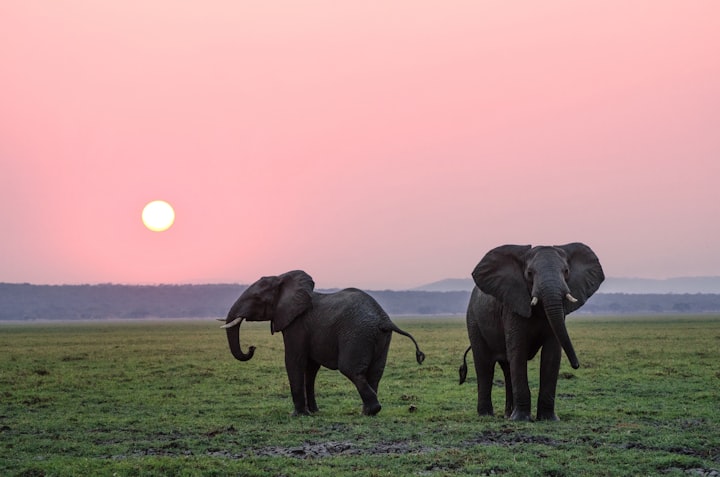How An Elephant Saved My Life
Learning To Communicate Is Important

“They say an elephant never forgets. But what they don’t tell you is that you never forget an elephant.” Bill Murray as Jack Corcoran.
A few years ago I met my first elephant.
Asian elephants are smaller than African ones. They range between 7–12 feet high and are considered one of the most intelligent creatures on the planet. They are an endangered species and protected in Thailand by law.
The National Elephant Institute promotes habitat restoration and the protection of the remaining wild elephants.
There is a large domesticated elephant population in Thailand.
In the past, they were used in wars, as transportation, or in logging. Now many elephants work in the tourism industry.
This has led to many elephants living a life of misery in city streets.
We had heard that some owners mistreat their elephants. Disreputable tourist attractions charge people to ride elephants through noisy city streets. This sensitive, intelligent animal was forced to shuffle along the same route over and over again. They were kept in tiny quarters in a city, never experiencing their natural environment.
When street elephants aren’t working, they’re chained, 24 hours a day, often on concrete floors in stressful locations. Worse, they can’t interact with each other which is very damaging to their well-being.
We didn’t want to have anything to do with animal cruelty.
After some discussion with a local travel agent, it was decided that we would travel to an elephant reserve outside of Chiang Mai and spend a day with the elephants living there.
We were going to Woody's Elephant Farm.
The taxi drove us into the mountains until the city fell away and the thick undergrowth of the jungle surrounded us. As the reserve came into view, we could see a young man on an elephant in the distance by a large muddy looking lake.
Woody’s Elephant Home was a farm that cared for a small number of animals. Their main crop was sugarcane, to feed the elephants.
We joined another group and sat at a long table in the main building to listen to the orientation.
Our day would be divided into three parts: Classroom learning, cleaning and maintenance of the elephant stalls, and an elephant ride through the jungle.
First, we needed to be properly dressed.
They gave us mahout clothing; a navy two-piece outfit similar to a karate costume. The pants were mid-length and tied with a thick drawstring and the jacket was wrapped and belted around the waist.
A mahout is the traditional elephant keeper.
In the past, they were assigned to an elephant as a young boy and the two would grow up together.
A mahout communicates with an elephant using voice commands and light touches.
When they ride they use a mahout stick, which is a metal stick about a foot long with a hook on one end. This is used to prod and pull the elephant to turn in one direction or another.
The instructor reassured us that the hook was never used in a way to hurt the elephant, but was used to tap them on the shoulders when riding.
We were to ride bareback, as a mahout did.

Next, the commands.
These elephants were trained to react to touch. When slight pressure is applied to the back of the foot, the elephant would lift its foot.
Usually, the light touch was accompanied by a verbal command, reinforcing the request. In this case, ‘taao’ in Thai for ‘foot’.
We also learned the following commands, which are shortened Thai words for:
Come: Maa / Forward: Hu-ee / Back: Toy-ee / Left: Sy-ee / Right: Kwaah and Slow : Baow baow
Then we cleaned up the elephant dung and swept the stalls.
We were given large two-handed tongs to pick up the dung, which was similar to a dried cow patty, only larger.
Finally, we met the elephants up close.
My elephant was smaller than some of the others, which stood around 8 feet at the shoulder. This was good because I’m a bit short. I greeted him properly by looking him in the eye as I said my name. Then I gave him a treat as a way to get to know him.
Mounting the elephant
We learned how to ask the elephant to bend one knee. The mahout showed us how to step up on the knee similar to putting your foot in a stirrup. He held the elephant's ear as he gracefully swung his other leg up and over it’s back, landing in a seated position. It looked easy enough.
Time for the ride
I gave the command to bend the knee, ‘taao’, and when he did I stepped up with one foot and tried to swing my other leg up onto his back. No luck. The elephant stood patiently while this awkward westerner tried again.
It was getting embarrassing and I could see the trainer was about to come over and give me a boost, which I didn’t relish.
I stepped up, swung my leg up hard, and felt a pop in my right buttocks as I settled onto the elephant's back.
I was successful.
Later I discovered I’d pulled a muscle which made it very uncomfortable to sit for weeks.
I ended up referring to my injury as ‘elephant butt’.
We rode in a lumbering line along a trail in the jungle, up a hillside and down the other side, circling around to end up near the lake had seen from the main building.
The elephants were going swimming and many of the tourists were delighted to ride them in. I opted to take photos as I didn’t relish a ride in a muddy pool in a foreign country.
It was a fun day and we arrived back at the hotel, hungry and sore.

A few days later we were in the open back of a pickup disguised as a bus, on our way to the King’s summer palace in the mountains.
The driver was going way too fast, racing up the hills around the steep corners. We were all hanging on, trying not to fall out of the back as he slammed us from side to side.
My husband reached up and tapped at the sliding window behind the driver's head.
When the driver slid it open, he yelled baow baow!
The look on the driver's face was priceless as he immediately slowed down, much to everyone’s relief.
It’s always important to learn some basic words when you’re in a foreign country, even if they’re meant for elephants.

If you enjoyed this story, send me a tip so I can write another one.
Or share it on social media. Your recognition means a lot to me.
This story also appears on Medium by Tree Langdon, the author.
About the Creator
Tree Langdon
Get an idea, a new word and a question.
For more, read my bio here.






Comments
There are no comments for this story
Be the first to respond and start the conversation.